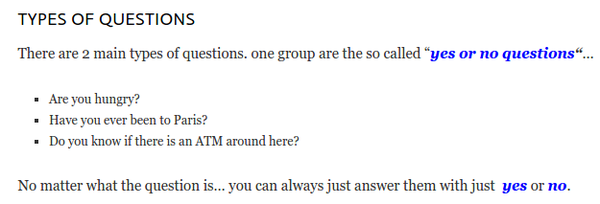

- There are two kind of questions.
- Yes or no questions.
- Questions that has a question word (5W + 1H).
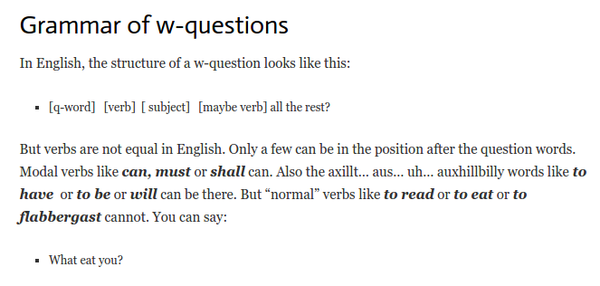
- In English here is a simple w - question structure likes.
- question_word + verb + subject + maybe_verb + the_rest_of_the_sentence?
- However not all verbs are all equal in English. There are modal verbs like can, must, shall. And there is also auxiliary verb like to have, to be, will.
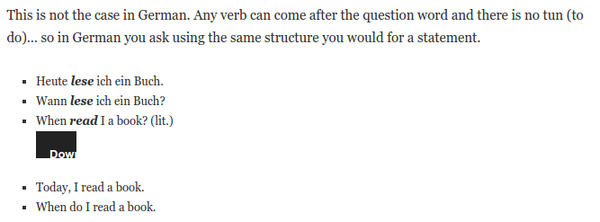
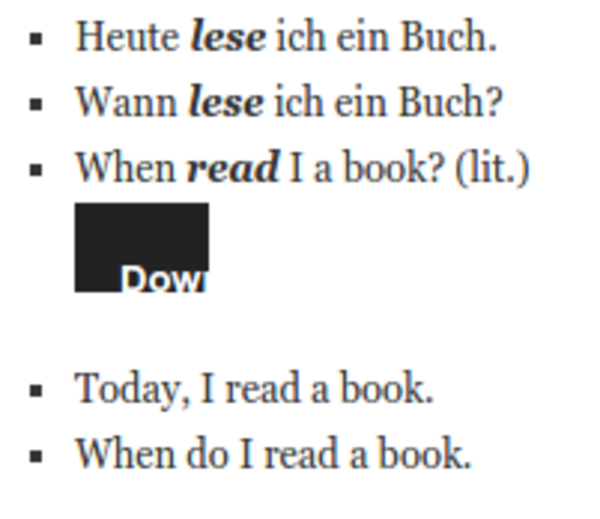
- Example in German.
- Heute lese ich ein Buch.
- Wann lese ich ein Buch?
- Today I read a book.
- When I read a book
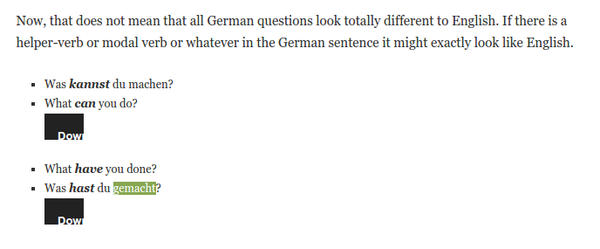
- "Was kannst du machen?" means "What can you do?".
- "Was hast du gemacht?" means "What have you done?".

- These are the safest patterns.
- subject + verb + adjective_or_adverb.
- question_word + verb + subject + adjective_or_adverb?
- This is a wrong pattern.
- question_word + do + subject + verb + adjective_or_adverb?
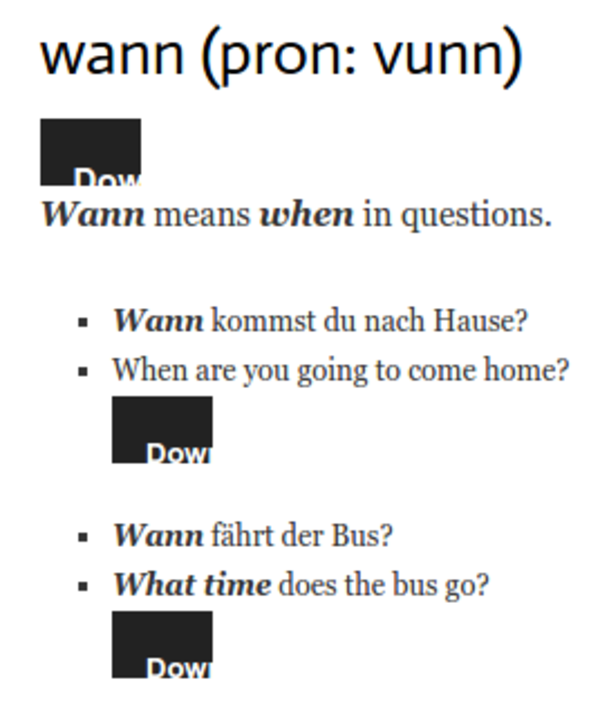
- "Wann" means "when".
- Examples.
- "Wann kommst du nach Hause?" means "When are you going to come home?".
- "Wann fahrt der Bus?" mean "What time does the bus go?" or "When the bus go?".

- "What time?" is never a proper way to ask for time in German language.
- So for asking time always use "wann".
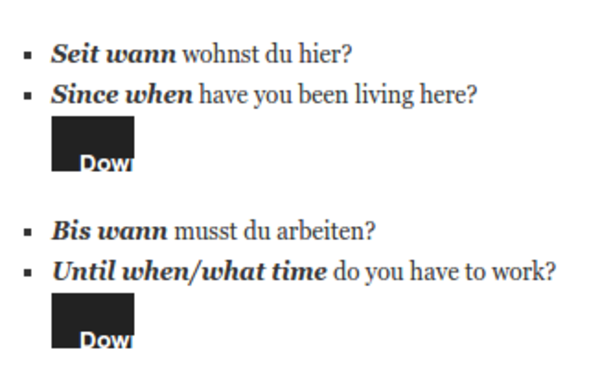
- "Bis" means "until when".
- "Seit" means "since when".
- Examples usage of "bis" and "seit".
- "Bis wann musst du arbeiten?" means "Until when you have to work?".
- "Seit wann wohnst du hier?" means "Since when have you been living here?".

- There is also a word called "wenn" which is a combination of "when" and "if".
- However this is not a question word. So, never use this for asking question.
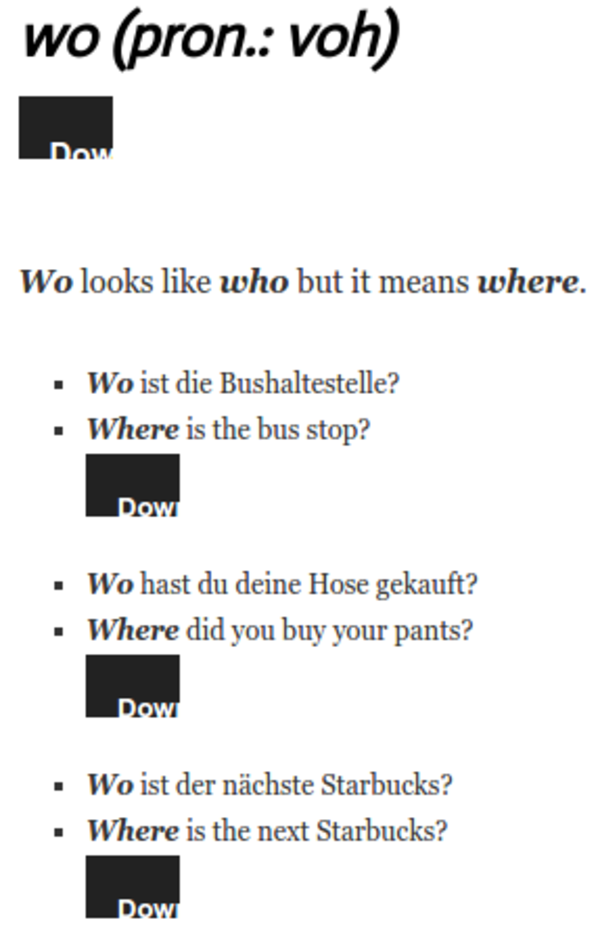
- "Wo" means "where".
- Examples.
- "Wo ist die Bushaltestelle?" means "Where is the bus stop?".
- "Wo hast du deine Hose gekauft?" means "Where did you buy your pants?".
- "Wo ist der nachtste Starbucks?" means "Where is the next Starbucks?".

- There are "woher and "wohin" as well.
- In German language places is separated into these.
- Place to go there.
- Place to be there.
- Place to come from there.
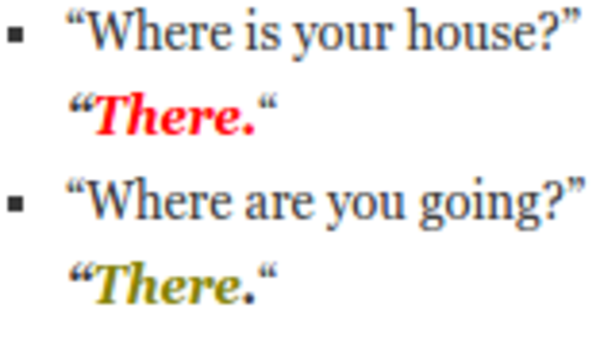
- For example "Where is your house?" means a place to be there.
- Whereas "Where are you going?" means a place to go there.

- "Wohin" always indicates that we are talking about destination.
- Whereas "woher" always indicates that we are talking about the origin.
- "Wo" indicates a place, static place.
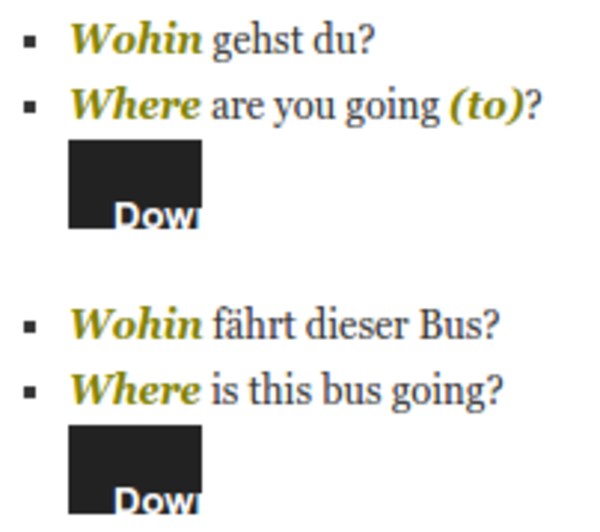
- Examples.
- "Wohin gehst du?" means "Where are you going (to)?".
- "Wohin fahrt dieser Bus?" means "Where is this bus going?".

- In contrast asking "Wo fahrt dieser bus?" means "Where is this bus located?" the answer could be "The bus is located at the bus station.".
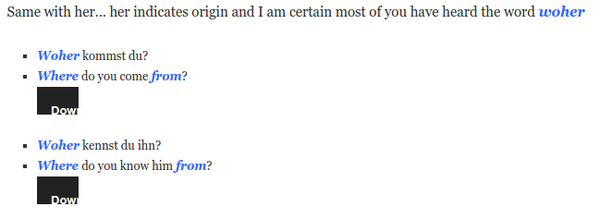
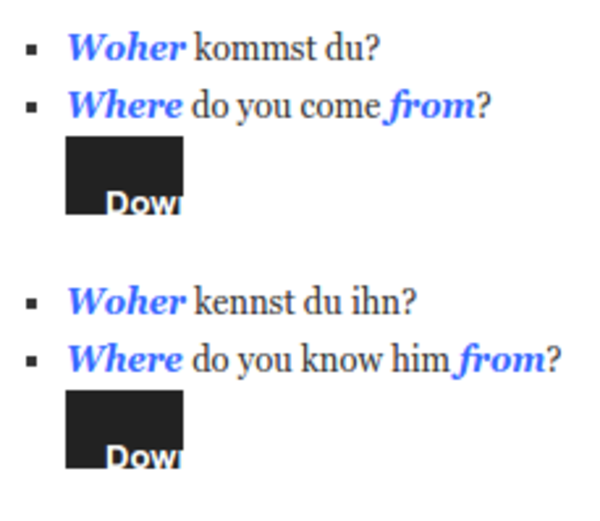
- Examples with "woher".
- "Woher komst du?" means "Where do you come from?".
- "Woher kennst du ihn?" means "Where do you know him from?".
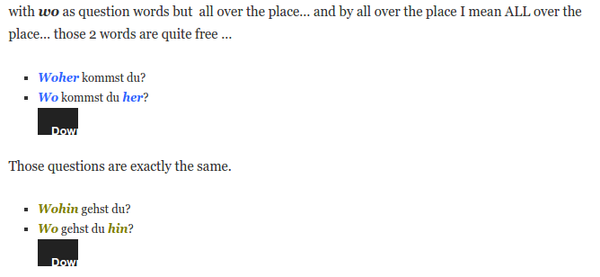
- Examples of the flexibility of using "wo".
- "Woher komst du?" can be asked with "Wo komst du her?".
- "Wohin gehst du?" can be asked with "Wo gehst du hin?".

- To sum up.
- "Wo" is used to ask for at what location.
- "Wohin" is used to ask to what location.
- "Woher" is used to ask from what location.
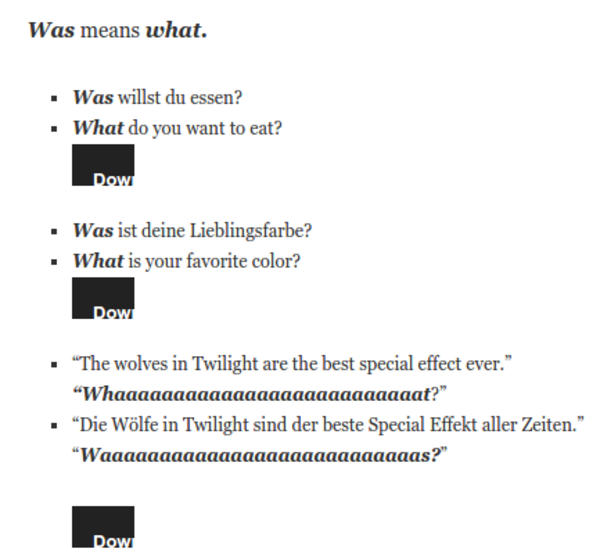
- "Was" means "what".
- Examples.
- "Was willst du essen?" means "What do you want to eat?".
- "Was ist deine Lieblingfarbe?" means "What is your favorite color?".
- Random sentence, "Die Wolfe in Twilight sind der beste Special Effekt aller Zeiten." means "The wolves in Twilight is the best special effect ever."
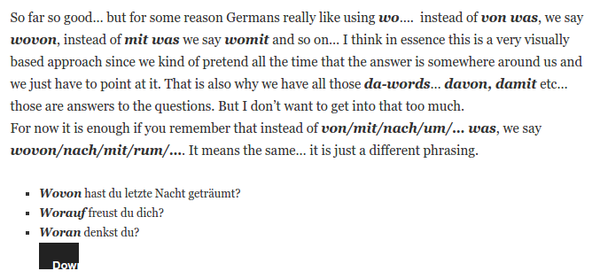
- Alright! There are these things about "was".
- For some reason German is really like to use "wo".
- Instead of "von was" they said "wovon".
- Instead of "mit was" they said "womit".
- There are other "wo" as well for "von", "mit", "nach", "um".
- In this guide it says that all of these variants are all the same.
- Example of sentence without the translations.
- Wovon hast du letzte Nacht getraumt?
- Worauf freust du dich?
- Woran denkst du?

- In English "what"can have a lot of preposition. These are some examples.
- What did you dream of last night?
- What are you looking forward to?
- What are you thinking about?
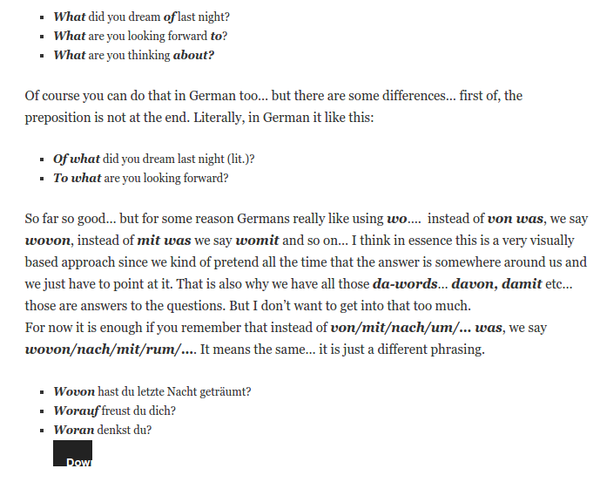
- In German the preposition is in the beginning of the sentence. These below are some example of the English sentences with the German sentence structure.
- Of what did you dream last night?
- To what are you looking forward?
- Hence, it is translated like these in German.
- Wovon hast du letzte Nacht getraumt?
- Worauf freust du dich?
- Woran denkst fu?
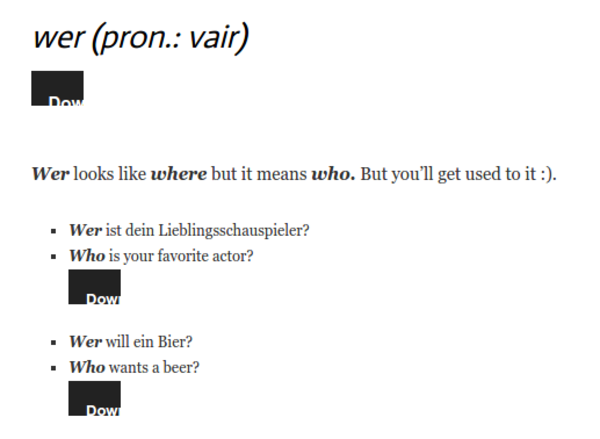
- "Wer" means "who".
- Examples.
- "Wer ist dein Lieblingsschauspieler?" means "Who is your favorite actor?".
- "Wer will ein Bier?" means "Who wants a beer?".

- "Worauf freust du dich?" means "What are you looking forward to?".
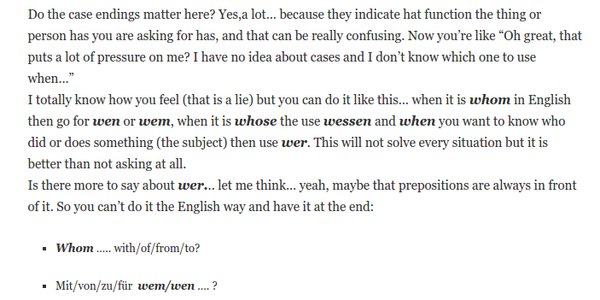

- "Whom" translates into "wem" or "wen".
- "Whose" translates into "wessen".
- If you want to know who did/does/is something then use "wer".
- When you are using "wer" always put the preposition in the front of it.
- In English the structure is like this whom + from_or_of_or_to_or_with?
- In German the structure is like this zu_oder_von_oder_fur_oder_mit + wem_oder_wen?
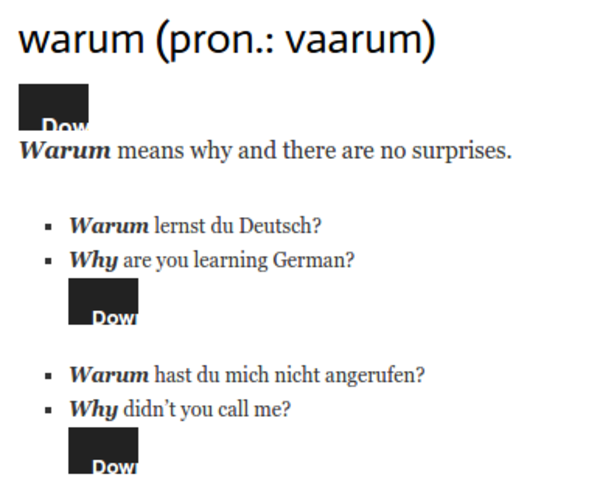
- "Warum" means "why".
- Examples.
- "Warum lernst du Deutsch?" means "Why are you learning German?".
- "Warum hast du mich nicht angerufen?" means "Why did not you call me?".
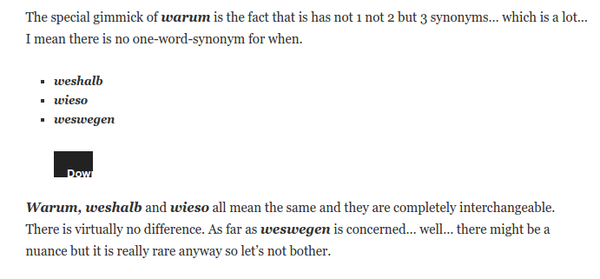
- There are three synonym of "warum", which are these.
- "Weshalb".
- "Weswegen".
- "Wieso".
- There are difference at all from all those words. So I might as well stick with "warum".
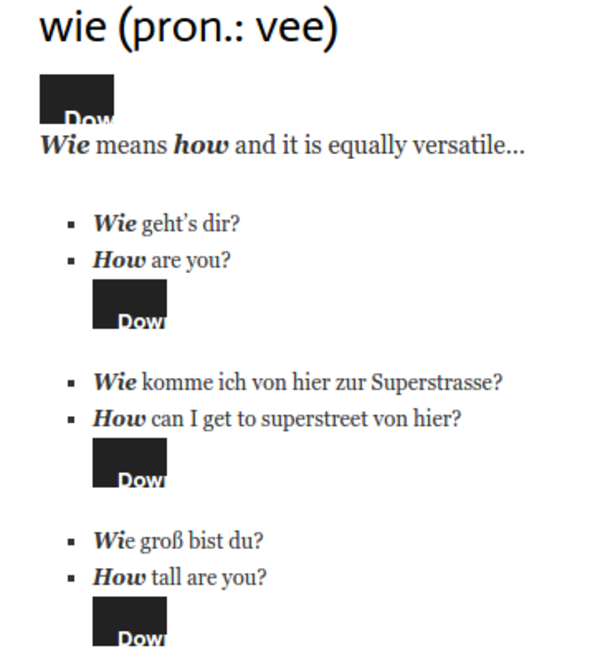
- "Wie" means "how".
- Examples.
- "Wie gehts dir?" means "How are you?".
- "Wie komme ich von hier zur Superstrasse?" means "How can I get to super street from here?".
- "Wie grosse bist du?" means "How tall are you?".
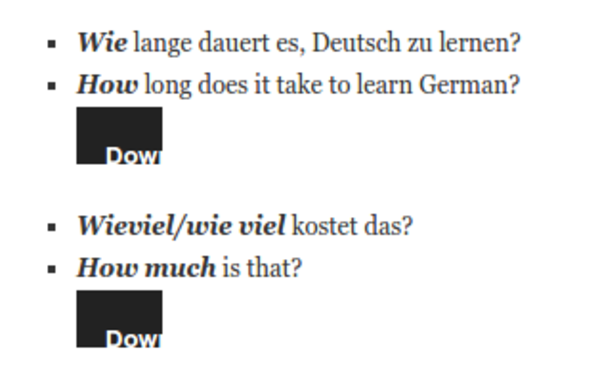
- Examples.
- "Wie lange dauert es, Deutsch zu lernen?" means "How long does it takes to learn German?".
- "Wie viel kostet das?" means "How much is that?".
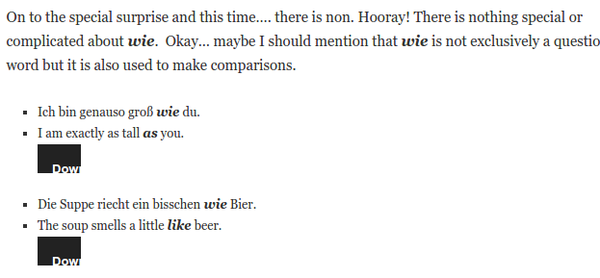
- "Wie" is also a word to make a comparison.
- For examples.
- "Ich bin genauso gross wie du." means "I am exactly as tall as you.".
- "Die Suppe riecht ein bisschen wie Bier." means "The soup smells a little like beer.".

- There are also "wieso" which means "how so".
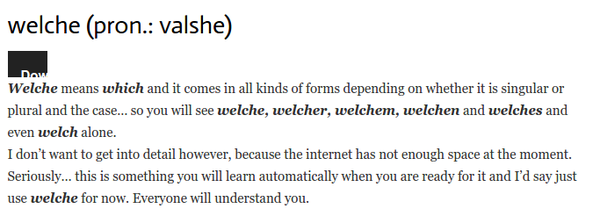
- "Welche" means "which".
- This word has a lot of forms like these.
- "Welche".
- "Welchem".
- "Welchen".
- "Welcher".
- "Welches".
- The form is depending on how the subject is singular or not.
- And I guess also depending on whether the subject is countable or not.

- But for all "welche" is just fine and correct.
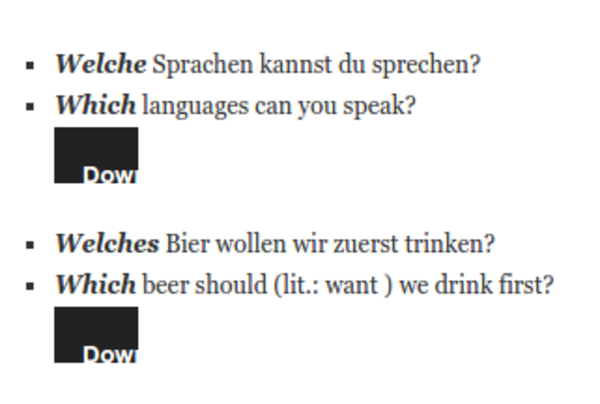
- Examples.
- "Welche Sprachen kannst du sprechen?" means "Which languages can you speak?".
- "Welches Bier wollen wir zuerst trinken?" means "Which beer should we drink first?".
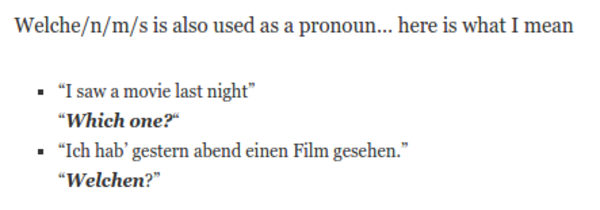
- "Welche"/"welchem"/"welchen"/"welches" can be used as well as pronoun. Here are some examples.
- "I saw a movie last night", "Which one?".
- "Ich hab gestern abend einen Film gesehen.", "Welchen?".

- There is nothing called "welche eine"/"which one" in German.











































